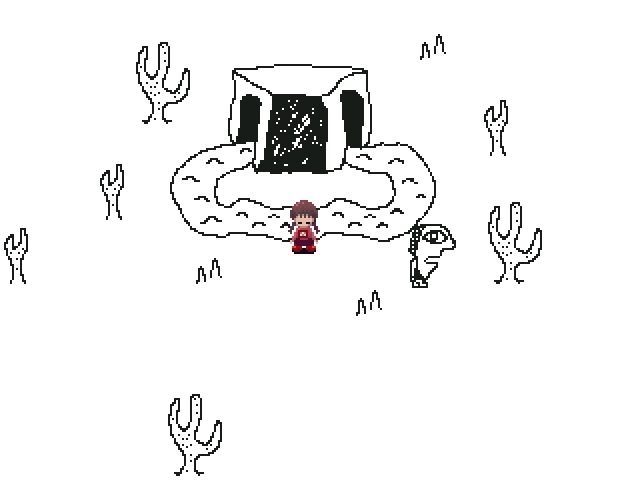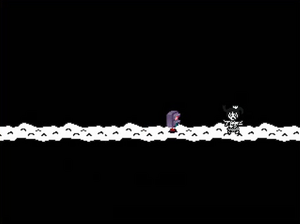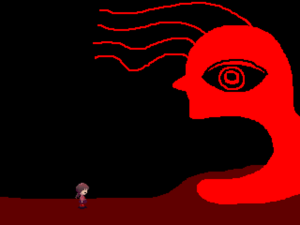Monoe(PHANTMa)
1998年7月20日
『serial experiments lain LAYER:4 RELIGION』#11:35~11:40
http://www.youtube.com/watch?v=qWuJr_1SOyM
http://ja.wikipedia.org/wiki/Serial_experiments_lain
2009年06月07日 10:30
"【ゆめにっき】そうだ、モノ江さんに会いに行こう。"#6:10~6:20
Added by "さんすう" http://www.nicovideo.jp/watch/sm7272248
Used by "さんすう" http://www.nicovideo.jp/user/11784773
PHANTMa(Tag (game))
Tag (also known as tip, tig, tiggy, dobby, dob, it,[1] chasey,[2] and many other names[3]) is a playground game that involves one or more players chasing other players in an attempt to "tag" or touch them, usually with their hand. There are many variations; most forms have no teams, scores, or equipment.
Encoded by Kick Ass Anime(English Sub)
Come visit us @ irc.mircx.com #KickAssAnime
1998年7月20日
『serial experiments lain LAYER:4 RELIGION』 #13:35~14:15
http://ja.wikipedia.org/wiki/Serial_experiments_lain
Monoe(Hide-and-seek)
Hide-and-seek or hide-and-go-seek is a game in which a number of players conceal themselves in the environment, to be found by one or more seekers. The game is played by one player (designated as being "it") counting to a predetermined number while the other players hide. After reaching the number, the player who is "it" tries to find the other players. [1]
Monoe(Spirit away)
1 ルール (1 Rule) 日本では近代まで神隠し・誘拐(人身売買)を恐れ、夕暮れ時以降はタブーであった[1]。
In Japan, disappearance and kidnapping (human trafficking) were feared till modernization, and it was a taboo after the time of twilight [1].
Monoko(Statues (game))
Red light/Green light (sometimes abbreviated as RLGL) is a variation of statues. The "it" person stands at one end of the playing field, with the rest of the players at the other end. "It" turns their back to the others and calls out "Green light!" The players then run as fast as they can towards "it". At any time, "it" can face the players, calling out "Red light", and the others must freeze in place. If anyone fails to stop, they are out or must return to the starting line.
Dave Spector(Manhunt)
3 Variants 3.10 Team tag 3.10.2 Manhunt
Main article: Manhunt (urban game)
Manhunt is a mixture of hide and seek and tag, often played during the day. One person is it, while the other players have to hide. Then, the person who is it tries to find and tag them. The game is over when all players are out. Manhunt is sometimes played with teams. In one variant there is a home base in which a player is safe. That version ends when all players who are not safe are out.
Big Red(Red Rover)
Red rover (also known as forcing the city gates and octopus tag) is an outdoor game played primarily by children on playgrounds. This 19th-century children's group game (requiring around 10 or more players total)[1] is thought to have originated in Britain and then spread to Australia, Canada and the United States.
Røver is a Norwegian word for "pirate", so perhaps the early British were showing bravery by daring the Viking raiders to "come over". The 1829 book titled The Red Rover: A Tale by James Fenimore Cooper describes the exploits of a pirate called "Red Rover".[2]
Big Red(Hana Ichi Monme)
Hana Ichi Monme (花一匁?) is a traditional Japanese children's game. The game is similar to the game Red Rover in the Western world. This game is often played in kindergartens and elementary schools.
Lyrics:
(1) Katte ureshii hana ichi monme
(2) Makete kuyashii hana ichi monme
(1) Ano ko ga hoshii
(2) Ano ko ja wakaran
(1) Sōdan shiyō
(2)Sō shiyō
Translation:
We're so happy we won, hana ichi monme
We're so upset we lost, hana ichi monme
We want that kid
We don't understand which kid you mean
Let's talk about it
Yes, let's
The children then huddle to choose a person from the opposing team and return back in line to call out...
※It seems that there is an opinion of having sung signs that he was bought for a human-trafficking contractor.
勝って:買って(won:buy)嬉しい花一匁
(子供が安く買えた。嬉しいねぇ)
He buys it and it is delightful Flower;Child 1匁;about 3.75g
(The child was able to buy it at a low price.I am glad.)
負けて:まけて(lost:price down)悔しい花一匁
(わが子が値切られてしまって悔しい)
A continuation of a song is also the same theory...




